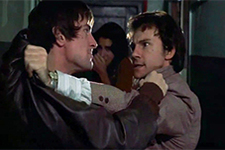Mean Streets (4K UHD)
|  Martin Scorsese directed three features before Mean Streets—the semi-autobiographical Who’s That Knocking at My Door (1967), which was an expansion of a short film he made as a student at NYU; Street Scenes (1970), a documentary about student protestors; and Boxcar Bertha (1972), a low-budget Bonnie and Clyde knock-off he made for Roger Corman—but I think we can agree that Mean Streets is where it really starts. Mean Streets is the film where Scorsese truly became Scorsese, the point where his style and substance first fully came together in a way that felt remarkably unique, compelling, compulsive. It is a film of great, raw energy, and even where it is rough around the edges it feels like the work of an old master who knows all the gears and levers and just how to pull them and when and isn’t afraid to buck tradition. A slice-of-urban-life tale about small-time hoods operating just on the edge of the Mafia in New York’s Little Italy, Mean Streets was a personal film for Scorsese, as it took place in the neighborhood where he grew up and many of the characters were based on people he knew. The protagonist, Charlie Cappa (Harvey Keitel), is a Scorsese surrogate, a man torn between his human desires and his religious convictions. Charlie works for his uncle, a powerful mafioso named Giovanni (Cesare Danova), which gives him a certain amount of clout in the neighborhood. He is friends with Michael (Richard Romanus), a loan shark, and Tony (David Proval), who runs the bar where they all hang out and make deals. Charlie’s problems, though, stem primarily from the responsibility he feels toward Johnny Boy (Robert De Niro), the cousin of his girlfriend, Teresa (Amy Robinson). Johnny Boy is brash and charismatic and fearless, and he owes money to virtually everyone in the neighborhood, including Michael, who is becoming increasing agitated about Johnny Boy’s brash unwillingness to pay up. Charlie is caught in the middle, torn between protecting Johnny Boy despite his indefensible behavior and upholding the realities of the business in which he operates, where debtors aren’t just charged interest, but possibly lose their lives. Charlie’s Catholic convictions cast a long shadow over his life, as well, inflicting a layer of guilt that he can’t quite shake. Scorsese, working with first-time cinematographer Kent L. Wakeford, who would also shoot his next film, Alice Doesn’t Live Here Anymore (1974), gives Mean Streets a propulsive drive and unique look and feel. With exteriors shot in and around Little Italy (most of the interiors were shot in Los Angeles to save money), Mean Streets often has a documentary feel, as the texture of the streets and alleys and tenement stairwells attest to the veracity of Scorsese’s narrative about small men striving for something bigger in a hard world that leaves little room for error. Scorsese vacillates wildly, but confidently, among styles: He employs a faux home-movie look for the opening credits, captures a rowdy fistfight among a dozen characters in a pool hall in a single take, and uses slow motion and the Rolling Stones’ “Jumpin’ Jack Flash” to firmly establish Johnny Boy’s captivating presence, which is either that of idiot-fool or a cunning shark. Scorsese bathes Ray’s bar in a hellish red light and doesn’t shy away from crushing darkness in the nighttime exteriors. The film is at times raw and real, and at other times it is dreamlike and uncanny. But, no matter what the scene, there is always the sense that Scorsese is in firm control. Even in the parts that don’t work as well dramatically, which include Charlie’s vexed relationship with Teresa, who he sees in secret, Mean Streets is never anything less than compelling. Of course, it is something of a miracle that it got made at all. Scorsese had originally penned the script back in the mid-1960s with Mardik Martin under the title Season of the Witch. Jay Cocks, who would go on to co-write Scorsese’s The Age of Innocence (1993), Gangs of New York (2002), and Silence (2016), suggested the title Mean Streets, which he borrowed from Raymond Chandler. Scorsese’s best chance to get it produced was through Roger Corman, who insisted that it be rewritten as a blaxpolitation film to take advantage of the new trend inspired by the success of Shaft (1971). Scorsese toyed with the idea, but rightly rejected it. He finally found financing with Jonathan Taplin, a road manager for Bob Dylan and The Band, both of whom would eventually become subjects for Scorsese documentaries (2019’s Rolling Thunder Revue and 1978’s The Last Waltz, respectively). Produced independently, it was picked up for distribution by Warner Bros., although its release was largely overshadowed by two other Warner films that season, the Robert Redford-Barbara Streisand romance The Way We Were and William Friedkin’s The Exorcist. Nevertheless, the film got enough exposure—including a slot in the 1973 New York Film Festival—to give Scorsese the exposure he needed to move on to other projects, including his next film, Alice Doesn’t Live Here Anymore, for which Ellen Burstyn won an Oscar, and, of course, his Palm d’Or-winning Taxi Driver (1976). Even more importantly, though, Mean Streets would ultimately become an inspiration to future independent filmmakers, a shining example of how a deeply personal film, yet highly entertaining, film could be made with both virtuosity and conviction.
Copyright © 2023 James Kendrick Thoughts? E-mail James Kendrick All images copyright © The Criterion Collection | |||||||||||||||||||||||||||||
Overall Rating: 


 (3.5)
(3.5)


